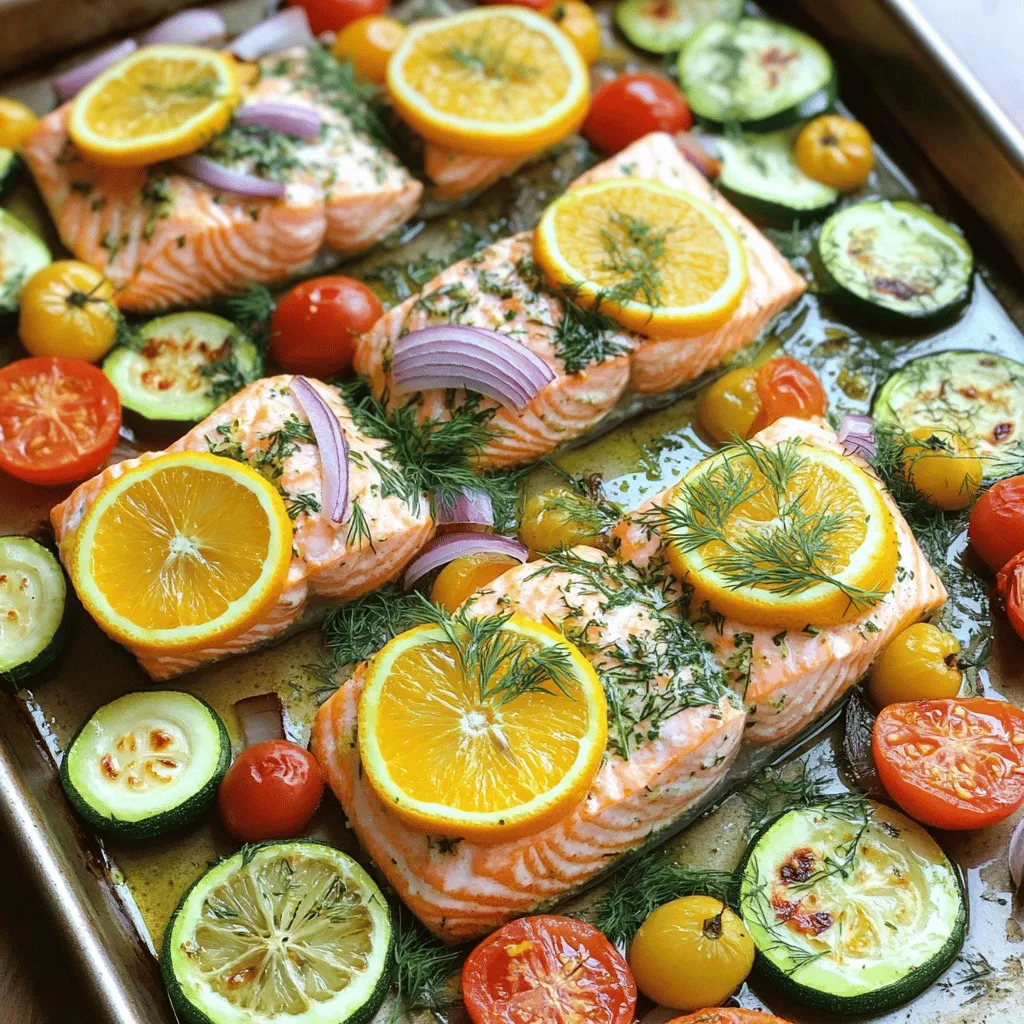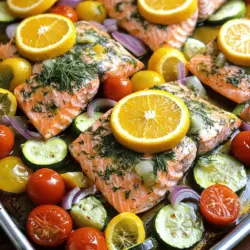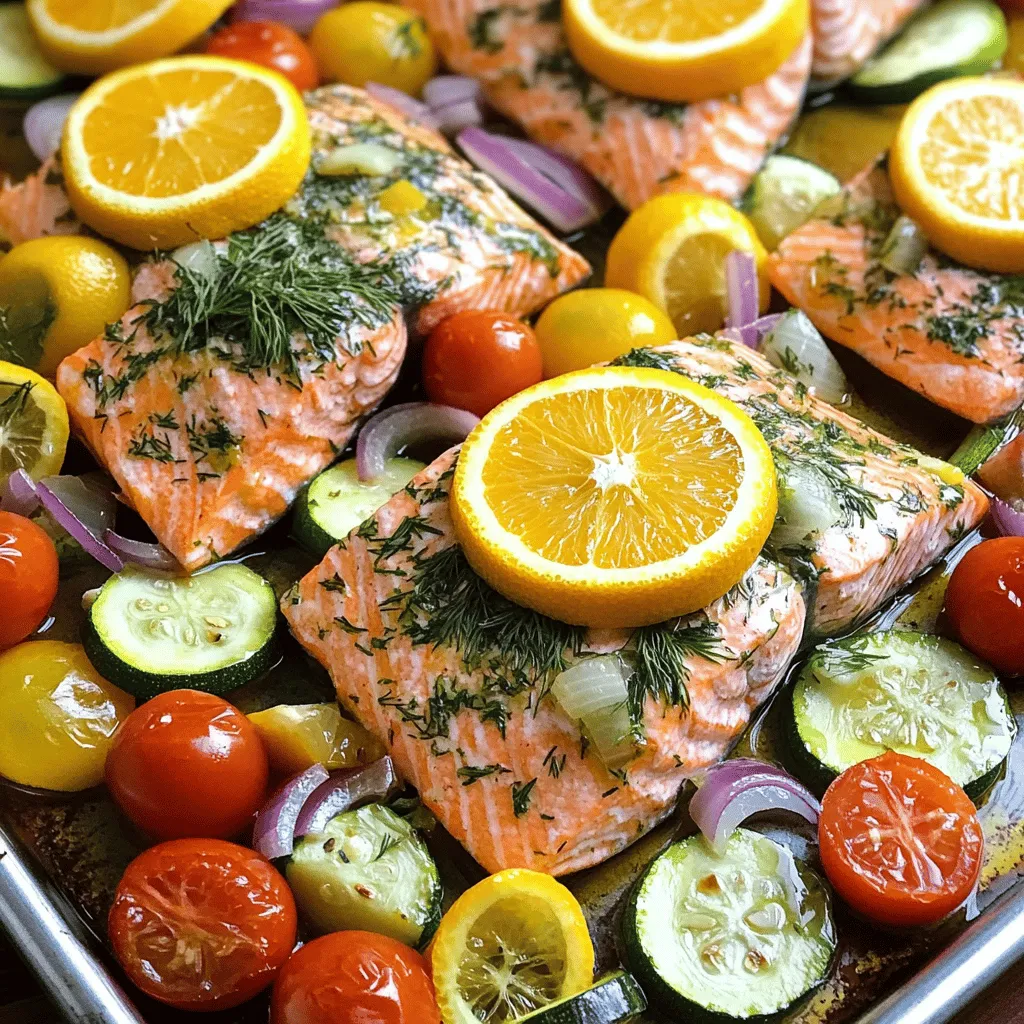Looking for a quick and tasty meal? This Sheet Pan Citrus Herb Salmon recipe is both simple and full of flavor! With fresh citrus, herbs, and your favorite veggies, you can create a delicious dinner in no time. Whether you’re cooking for yourself or entertaining guests, this dish is sure to impress. Read on for easy steps to make a healthy and tasty meal that anyone can enjoy!
Ingredients
List of Ingredients
- 4 salmon fillets (6 oz each)
- 2 oranges, one sliced into rounds and one juiced
- 1 lemon, sliced into rounds
- 1 lime, sliced into rounds
- 3 tablespoons olive oil
- 2 tablespoons fresh parsley, chopped
- 1 tablespoon fresh dill, chopped
- 2 cloves garlic, minced
- Salt and pepper to taste
- 1 cup cherry tomatoes, halved
- 1 zucchini, sliced
- 1 red onion, cut into wedges
Ingredient Substitutions
- Alternative proteins: You can use chicken breasts or tofu for a different flavor.
- Vegetable options: Try bell peppers, asparagus, or broccoli for variety.
- Fresh herb alternatives: Swap parsley with cilantro or basil for new tastes.
Tips for Selecting Fresh Ingredients
- Choosing the best salmon: Look for bright color and no strong fishy smell.
- Selecting ripe citrus fruits: Choose fruits that feel heavy and firm, with smooth skin.
- Fresh vs. dried herbs: Fresh herbs pack more flavor than dried ones. Use about three times more fresh herbs if substituting.”
Step-by-Step Instructions
Preparation Steps
- Prepping the oven and pan
Start by preheating your oven to 400°F (200°C). This ensures even cooking for the salmon and veggies. Line a sheet pan with parchment paper. This makes cleanup quick and easy.
- Making the marinade
In a small bowl, whisk together three tablespoons of olive oil, the juice from one orange, minced garlic, chopped parsley, chopped dill, salt, and pepper. This marinade adds flavor to the salmon and veggies. Set it aside for now; we will use it soon.
Cooking Steps
- Arranging ingredients on the sheet pan
Place the salmon fillets on one side of the prepared sheet pan. Pour half of the marinade over the salmon. Make sure each piece is well-coated. On the other side, arrange halved cherry tomatoes, sliced zucchini, and red onion wedges. Drizzle the rest of the marinade over the vegetables. Toss gently to coat.
- Baking times and tips
Layer citrus slices over the salmon and veggies. Use the orange, lemon, and lime slices for a burst of flavor. Bake in the oven for 15 to 20 minutes. The salmon is done when it flakes easily with a fork, and the veggies are tender. Keep an eye on them to avoid overcooking.
Finishing Touches
- Serving suggestions
Once baked, remove the sheet pan from the oven. Let it rest for a couple of minutes. You can serve it directly from the pan for a rustic feel.
- Plating tips
If you prefer individual plates, transfer each portion carefully. Garnish each plate with fresh herbs and a slice of citrus. This adds a nice touch and looks great on the table. Enjoy your meal!
Tips & Tricks
Cooking Tips
To avoid overcooking salmon, start with fresh fillets. Place them on the pan skin-side down. Check salmon around 15 minutes into baking. It should flake easily with a fork when done. If it looks dry, it’s overcooked.
For even cooking of vegetables, cut them into similar sizes. Use a mix of soft and firm veggies. Cherry tomatoes and zucchini cook fast. Add harder veggies like onions first, then softer ones later. This keeps everything tender and tasty.
Flavor Enhancements
You can add spices for extra flavor. Try paprika, cumin, or chili flakes. A splash of hot sauce can give it a nice kick. For sauces, a drizzle of soy sauce or honey works great.
Combining different herbs can enhance the dish. Mix parsley with cilantro for a fresh taste. Basil or thyme can also add depth. Feel free to experiment to find your favorite blend.
Presentation Tips
For serving style, you can leave the dish on the sheet pan. This gives a rustic and homey feel. If you want a fancier look, plate the salmon and veggies separately.
For garnishing, use extra herbs on top for color. A slice of citrus can add brightness. A sprinkle of sea salt can also elevate the look and taste. These small touches make your dish appealing and fun to eat.

Variations
Flavor Variations
You can change the herbs for your salmon. Try using basil, thyme, or cilantro. Each herb brings its own taste. You can even mix them for more flavor. Citrus swaps work well too. Use grapefruit or tangerine instead of oranges. These changes can make your dish unique and fun.
Dietary Adaptations
To make this dish gluten-free, simply check your ingredients. Most of them are already gluten-free. Avoid sauces or additives that may contain gluten. For low-carb options, skip the zucchini and tomatoes. Add more leafy greens instead. Spinach or kale works great. These tweaks keep your meal healthy without losing taste.
Seasonal Variations
You can adapt this recipe for each season. In spring, add asparagus or snap peas for bright colors. Summer is perfect for bell peppers or corn. In fall, use Brussels sprouts or sweet potatoes. Winter calls for root veggies like carrots and parsnips. These seasonal vegetables not only taste great but also add nutrition.
Storage Info
Storing Leftovers
To keep leftovers fresh, place your salmon in an airtight container. Make sure to refrigerate it within two hours of cooking. This helps keep it safe and tasty. If you have extra veggies, store them in the same way. For freezing, wrap each salmon fillet in plastic wrap and then place it in a freezer bag. This will prevent freezer burn. You can freeze it for up to three months.
Reheating Suggestions
When you reheat salmon, do it gently to avoid drying it out. The best way is to use the oven. Preheat it to 275°F (135°C) and place the salmon in a baking dish. Cover it with foil to keep moisture in. Heat for about 15 minutes or until warm. If you want quick meals, portion leftovers into single servings. This makes meal prep easy for your busy days.
Shelf Life
In the fridge, cooked salmon lasts about three days. Check for any odd smells or a slimy texture. These are signs it may have spoiled. If your leftover veggies look wilted or discolored, it’s best to throw them away. Always trust your senses when it comes to food safety.
FAQs
Common Questions
How to know when salmon is done?
Salmon is done when it flakes easily with a fork. You can also check the color. The inside should be a light pink. Use a food thermometer if you like. Aim for an internal temperature of 145°F (63°C). This ensures it is safe to eat and still juicy.
Can I use frozen salmon for this recipe?
Yes, you can use frozen salmon. Just make sure to thaw it first. You can leave it in the fridge overnight or use cold water for quick thawing. Pat the salmon dry before cooking. This helps the marinade stick better and gives a nice crust.
Ingredient Substitution Questions
What can I use instead of olive oil?
You can use other oils like avocado oil or canola oil. Both have a mild taste and high smoke point. Avocado oil adds healthy fats and a nice flavor. You could also use melted butter for a rich taste.
Can I replace citrus fruits with other flavors?
Yes, you can. Try using vinegar or different fruits like apples or peaches. These will change the taste but still add freshness. Experiment with different herbs, too, like basil or cilantro, for a new twist.
Cooking Technique Questions
Is it necessary to marinate the salmon?
Marinating is not required but highly recommended. It adds flavor and helps keep the fish moist. If you’re short on time, you can skip it. Just season the salmon well before cooking.
Can I make this recipe on a grill?
Absolutely! You can grill the salmon instead of baking it. Make sure to use a grill basket or foil to hold the salmon and veggies. Keep an eye on the cooking time. Grill until the salmon is flaky and veggies are tender.
In summary, this guide shows how to prepare a tasty salmon dish with fresh ingredients. You learned about key ingredients, useful substitutions, and tips for selecting the best quality. We covered step-by-step instructions for cooking, enhancing flavors, and creative presentations. You also gained insight on variations for different diets and storing leftovers.
Remember, cooking should be fun and rewarding. Experiment and enjoy the process!

